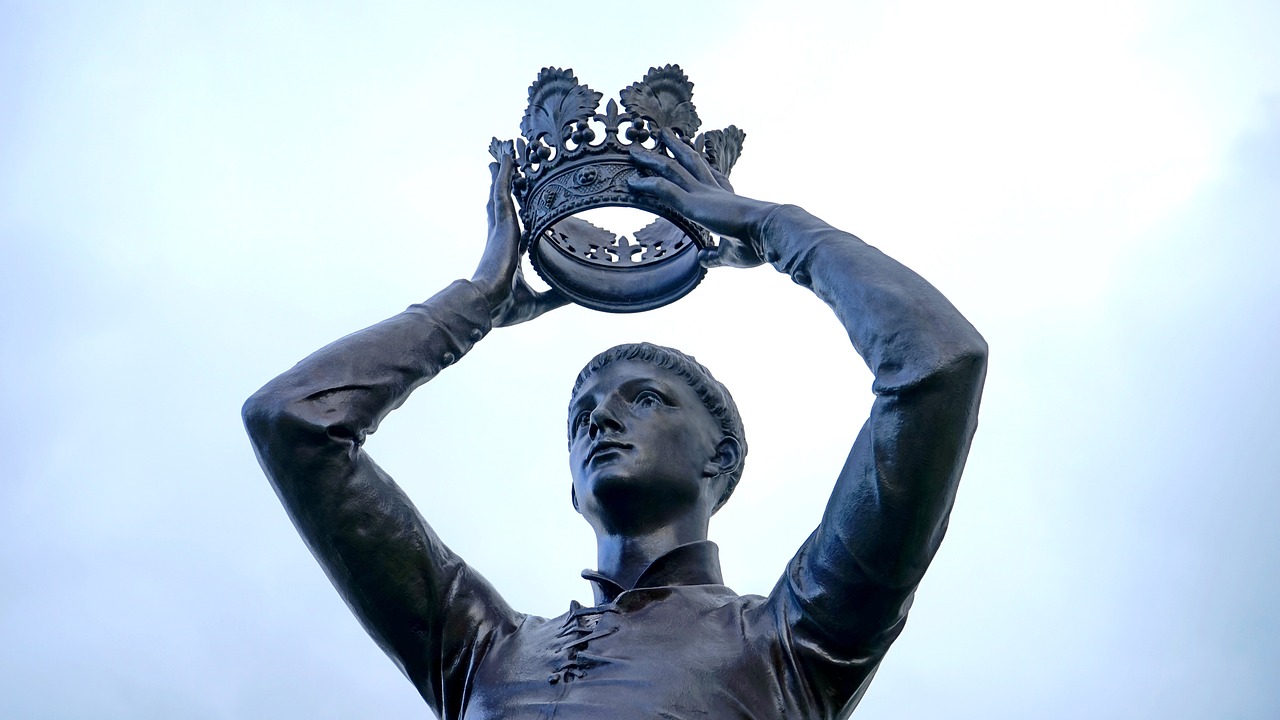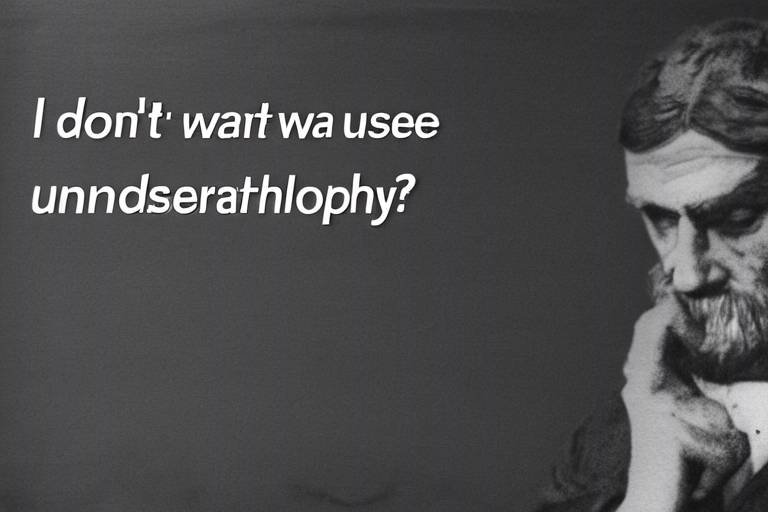Philosophical Themes in Shakespeare's Plays: An Overview
William Shakespeare, often hailed as one of the greatest playwrights of all time, masterfully wove profound philosophical themes into the fabric of his plays. These themes resonate with audiences even today, prompting us to ponder fundamental questions about existence, morality, and the very nature of reality. Shakespeare's works are not just mere stories; they are deep explorations of the human condition, reflecting the complexities of life and the struggles of individuals as they navigate their paths through a world filled with uncertainty.
At the heart of Shakespeare's plays lies a rich tapestry of existential thought. Characters grapple with their identities, face moral quandaries, and confront the often-blurred lines between illusion and truth. This exploration is not limited to a single play or character; it spans across his entire oeuvre, inviting audiences to engage with the philosophical questions that have plagued humanity for centuries. As we delve deeper into these themes, we uncover a treasure trove of insights that remain strikingly relevant to contemporary thought.
One of the most compelling aspects of Shakespeare's philosophical inquiry is his ability to intertwine these themes with the emotional and psychological struggles of his characters. Whether it’s the tortured prince of Denmark or the ambitious Scottish lord, each character embodies a unique perspective on the questions of life, death, and morality. This article will examine these themes in detail, shedding light on how Shakespeare's insights continue to resonate with us today.
In the following sections, we will explore specific philosophical themes present in Shakespeare's works, including the nature of reality, existentialism, and the moral landscape that defines his characters' journeys. Through this exploration, we aim to highlight not only the depth of Shakespeare's understanding of human nature but also the timelessness of his insights that continue to inspire and challenge us.
- What are some of the main philosophical themes in Shakespeare's plays?
Shakespeare explores themes such as existence, morality, reality, and the human condition, often through the struggles of his characters. - How does Shakespeare portray existentialism?
Existential themes are evident in characters like Hamlet, who wrestles with questions of purpose and identity. - What role does morality play in Shakespeare's works?
Morality is a central theme, with characters facing dilemmas that challenge their sense of right and wrong, as seen in plays like Hamlet and The Merchant of Venice. - Are Shakespeare's philosophical themes relevant today?
Yes, the questions and dilemmas posed in his plays continue to resonate with modern audiences, prompting reflection on our own lives and choices.

The Nature of Reality
Shakespeare's works are a treasure trove of philosophical inquiry, and one of the most compelling themes he explores is the nature of reality. His plays often challenge audiences to question what is real and what is merely an illusion. Through intricate plotlines and complex characters, Shakespeare blurs the lines between truth and deception, inviting us to delve deeper into our understanding of existence.
Take, for instance, the world of “A Midsummer Night's Dream”. The enchanted forest serves as a backdrop where reality bends and twists, leading characters to experience love and confusion in equal measure. The play raises the question: Is love a product of reality or merely a trick of the imagination? This theme resonates with audiences today, as we grapple with our own perceptions of love and reality in an age dominated by social media and filtered experiences.
Another striking example is found in “The Tempest”, where Prospero's manipulation of magical elements creates a reality that is both enchanting and deceptive. The island serves as a microcosm of the world, where characters confront their true selves and the consequences of their actions. Here, Shakespeare invites us to ponder: How much of our reality is shaped by external forces, and how much is a product of our own making?
Shakespeare also employs the motif of madness to further explore the nature of reality. In “Hamlet”, the protagonist's feigned insanity allows him to navigate the treacherous waters of the Danish court. But what does it mean to be truly mad? Is madness simply a different way of perceiving reality, or does it signify a deeper disconnect from the world around us? Hamlet's struggle with his own sanity reflects the complexities of human thought and the often fragile nature of our understanding of reality.
To illustrate this theme further, we can look at the following table that summarizes key elements of reality as depicted in Shakespeare's plays:
| Play | Key Theme | Questions Raised |
|---|---|---|
| A Midsummer Night's Dream | Illusion vs. Reality | Is love real or an illusion? |
| The Tempest | Manipulation of Reality | How much is shaped by external forces? |
| Hamlet | Madness and Perception | What is the nature of sanity? |
Through these explorations, Shakespeare compels us to confront our own beliefs about reality. Are we merely players on a stage, acting out roles assigned to us by society, or do we have the power to shape our own destinies? The questions he raises remain relevant today, as we navigate an increasingly complex world filled with competing narratives and perspectives.
Ultimately, the nature of reality in Shakespeare's plays serves as a mirror reflecting our own struggles with truth, perception, and existence. By engaging with these themes, we not only gain insight into the characters' journeys but also embark on a personal quest to understand our own realities. So the next time you find yourself lost in one of Shakespeare's works, take a moment to ponder: What truths lie beneath the surface of this story, and how do they resonate with my own life?
- What is the main theme of reality in Shakespeare's plays? The nature of reality in Shakespeare's works often revolves around the distinction between illusion and truth, prompting audiences to question their own perceptions.
- How does madness relate to reality in Shakespeare's plays? Madness serves as a lens through which characters explore deeper truths about their existence, often highlighting the complexity of human thought and perception.
- What relevance do Shakespeare's themes of reality have today? Shakespeare's exploration of reality continues to resonate, encouraging contemporary audiences to reflect on their own experiences and the nature of truth in a complex world.

Existentialism in Shakespeare
Shakespeare's works are a treasure trove of existential themes, where the struggle for meaning and identity takes center stage. The characters he created are not just players on a stage; they are complex beings grappling with profound questions about their existence and purpose. In a world that often feels chaotic and uncertain, Shakespeare’s characters resonate with our own struggles, making his plays timeless and relevant even today. Each character embodies a unique existential dilemma, forcing audiences to confront their own beliefs and values.
Take, for instance, the character of Hamlet. He is perhaps the most iconic representation of existential thought in Shakespeare's canon. Hamlet's journey is not merely about avenging his father's death; it’s a deep dive into the abyss of human consciousness. He questions everything—his existence, the morality of revenge, and the very nature of reality. This reflects a broader existential crisis that many face: the search for meaning in a world that often seems devoid of it. The internal conflict he experiences is a mirror for our own doubts and fears about life.
Furthermore, the character of Macbeth presents another layer of existential inquiry. The tension between fate and free will is palpable throughout the play. Macbeth’s choices lead him down a dark path, raising questions about whether he is merely a pawn of fate or if he possesses the autonomy to shape his own destiny. This dilemma is not just a plot device; it invites the audience to ponder their own lives. Are we the architects of our fate, or are we simply reacting to the whims of the universe? Shakespeare doesn’t provide easy answers, leaving us to wrestle with these questions long after the curtain falls.
In addition to these characters, Shakespeare employs various literary devices to explore existential themes. For example, the use of soliloquies allows characters to voice their innermost thoughts and fears. These moments of introspection serve as a powerful tool for audiences to engage with the philosophical underpinnings of the plays. They create a space where the audience can reflect on their own existence and the choices they make.
As we navigate through Shakespeare's works, we encounter a myriad of existential questions that challenge our understanding of life. The plays often highlight the absurdity of human existence, where characters face situations that seem both ridiculous and tragic. This duality is a hallmark of existential literature, prompting us to reflect on our own lives and the choices we make. Shakespeare’s exploration of existentialism transcends time, making his works a profound commentary on the human condition.
Ultimately, Shakespeare's examination of existential themes leads to a richer understanding of ourselves. His characters remind us that the quest for meaning is a universal experience, one that connects us across generations. By grappling with the same questions that haunted Shakespeare's characters, we find a sense of solidarity in our struggles for identity and purpose.
- What is existentialism in literature?
Existentialism in literature focuses on the individual's experience, emphasizing themes of choice, freedom, and the search for meaning in an often indifferent universe.
- How does Shakespeare explore existential themes?
Shakespeare explores existential themes through complex characters who face moral dilemmas, question their existence, and grapple with the concepts of fate and free will.
- Which Shakespeare play is most associated with existentialism?
While many of Shakespeare's plays contain existential themes, Hamlet is often regarded as the most profound exploration of existential thought, particularly through Hamlet's soliloquies.

Hamlet's Existential Crisis
In Shakespeare's Hamlet, the titular character is not just a prince; he is a profound thinker wrestling with some of life's most daunting questions. His existential crisis is a central theme that resonates deeply with audiences, both in his time and today. Hamlet's journey is marked by a series of soliloquies that peel back the layers of his psyche, revealing a man who is caught in a web of uncertainty and despair. What does it mean to exist? Is life worth living when faced with inevitable death? These are the questions that haunt him, and they reflect the very essence of existential philosophy.
One of the most poignant moments in the play is encapsulated in Hamlet's famous soliloquy, To be, or not to be. Here, Hamlet contemplates the nature of existence itself, weighing the pain and suffering of life against the fear of the unknown that comes with death. This soliloquy serves not only as a reflection of Hamlet's internal conflict but also as a universal meditation on the human condition. The depth of his introspection invites the audience to ponder their own lives, making it a timeless exploration of existential thought.
Hamlet's struggle is further complicated by his feigned madness, a strategic choice that allows him to navigate the treacherous waters of the court while searching for truth. This act of madness is not merely a plot device; it serves as a lens through which we can examine the complexities of human thought and perception. As Hamlet oscillates between sanity and insanity, the audience is left questioning the very nature of reality. Are his actions driven by madness, or is he uncovering profound truths about the world around him? In this sense, madness becomes a vehicle for exploring deeper existential themes.
Moreover, Hamlet's relationships with other characters—such as Ophelia and Gertrude—further illuminate his existential crisis. Ophelia's descent into madness parallels Hamlet's own turmoil, highlighting the fragility of the human mind when confronted with overwhelming grief and betrayal. Gertrude's hasty remarriage to Claudius adds another layer of complexity, forcing Hamlet to grapple with feelings of abandonment and disillusionment. These dynamics not only enrich the narrative but also underscore the existential dilemmas faced by individuals in a world fraught with moral ambiguity.
Ultimately, Hamlet's existential crisis is a reflection of the broader human experience. It challenges us to confront our own fears and uncertainties, urging us to seek meaning in a seemingly chaotic world. As we navigate our lives, we may find ourselves asking similar questions: What is my purpose? How do I define my existence? In this way, Shakespeare's exploration of existentialism in Hamlet transcends time, inviting each generation to engage with these profound inquiries.
- What is the main theme of Hamlet's existential crisis?
Hamlet's existential crisis revolves around the questions of existence, purpose, and the nature of reality, as he grapples with life, death, and moral ambiguity. - How does Hamlet's soliloquy reflect existential philosophy?
The soliloquy To be, or not to be encapsulates Hamlet's internal conflict and serves as a meditation on the human condition, weighing the value of life against the fear of death. - What role does madness play in Hamlet's character development?
Hamlet's feigned madness allows him to explore deeper truths about reality and perception, blurring the lines between sanity and insanity. - How do Hamlet's relationships influence his existential thoughts?
His relationships with characters like Ophelia and Gertrude highlight his feelings of betrayal and abandonment, deepening his existential crisis and reflecting the complexities of human emotion.

Hamlet,
This article explores the profound philosophical themes woven throughout Shakespeare's plays, examining concepts such as existence, morality, and the nature of reality, and their relevance to contemporary thought.
Shakespeare's plays often question the nature of reality, blurring the lines between illusion and truth. This subheading delves into how these themes are portrayed through various characters and plotlines.
Existential themes are prevalent in Shakespeare's works, reflecting the human struggle for meaning and identity. This section analyzes key characters that embody existential dilemmas and their philosophical implications.
In Hamlet, the titular character grapples with profound questions about existence, death, and purpose. This subheading examines Hamlet's soliloquies as reflections of existential thought. The play's intricate exploration of the human psyche reveals a character torn between action and inaction, highlighting the universal struggle we all face when confronted with the weight of our own choices. Just like a ship lost at sea, Hamlet navigates through the turbulent waters of doubt and despair, searching for a beacon of clarity amidst the chaos of his thoughts.
The famous soliloquy To be, or not to be encapsulates Hamlet's internal conflict and the essence of existential philosophy. This analysis highlights its significance in understanding human consciousness. In this moment of introspection, Hamlet weighs the merits of existence against the allure of oblivion. It's a poignant reflection that resonates with anyone who has ever pondered the meaning of life. The soliloquy raises essential questions: Is it nobler to endure life's hardships, or to take action against a sea of troubles? This conflict is not just Hamlet's; it is a mirror reflecting our own existential battles.
Hamlet's feigned madness serves as a vehicle for exploring deeper truths about reality and perception. This section discusses how madness reflects the complexities of human thought. By adopting the guise of insanity, Hamlet is able to navigate the treacherous waters of the court without revealing his true intentions. His madness acts as a lens through which the audience can examine the nature of reality itself. Are we, too, wearing masks in our daily lives, hiding our true selves behind a façade? Shakespeare invites us to question the very fabric of our perceptions and the reality we construct around us.
In Macbeth, the tension between fate and free will is a central theme. This subheading explores how the characters' choices shape their destinies and reflect philosophical inquiries into autonomy.
Shakespeare's exploration of morality raises questions about right and wrong, justice, and the human condition. This section investigates how these themes manifest in various plays and characters.
The interplay of justice and revenge in plays like Hamlet and The Merchant of Venice illustrates moral ambiguity. This analysis highlights the consequences of vengeance on the human psyche.
Shakespeare’s treatment of love often involves ethical dilemmas, prompting reflections on loyalty, betrayal, and sacrifice. This subheading examines how love challenges moral boundaries in his works.
Q: What are the main philosophical themes in Shakespeare's plays?
A: The main themes include the nature of reality, existentialism, morality, and the struggle between fate and free will.
Q: How does Hamlet reflect existential philosophy?
A: Hamlet's soliloquies, especially "To be, or not to be," delve into questions of existence, purpose, and the human condition.
Q: What role does madness play in Hamlet?
A: Madness serves as a critical lens through which Hamlet explores deeper truths about reality and perception, allowing him to navigate the complexities of his situation.
Q: How are justice and revenge portrayed in Shakespeare's works?
A: Shakespeare often presents a complex interplay between justice and revenge, highlighting moral ambiguities and the psychological consequences of vengeance.

the titular character grapples with profound questions about existence, death, and purpose. This subheading examines Hamlet's soliloquies as reflections of existential thought.
In Shakespeare's Hamlet, the titular character grapples with profound questions about existence, death, and purpose. This internal struggle is not just a plot device; it serves as a mirror reflecting the existential dilemmas that many of us face in real life. Hamlet's soliloquies, particularly his famous contemplations, delve deep into the human psyche, exploring the essence of what it means to be alive. Through his words, we witness a character caught in a whirlwind of thoughts, battling with the weight of his own consciousness.
One of the most striking aspects of Hamlet's existential crisis is his profound sense of uncertainty. He questions everything around him, from the authenticity of the world he inhabits to the very nature of his own existence. In a world that seems to be built on deception and betrayal, Hamlet's struggle becomes a quest for truth. His soliloquies resonate with anyone who has ever felt lost or overwhelmed by the complexities of life. They invite us to reflect on our own experiences and the inherent chaos of human existence.
His famous line, “To be, or not to be”, encapsulates this existential conflict. It is a poignant inquiry into the value of life itself, where Hamlet weighs the pain of existence against the fear of the unknown that comes with death. This moment of introspection is not merely a philosophical musing; it is a raw expression of human vulnerability. The question he poses is universal: Is it nobler to endure the struggles of life or to seek a release from suffering through death?
Furthermore, Hamlet's soliloquies serve as a platform for exploring the concept of madness and how it intertwines with reality. As he feigns insanity to navigate the treacherous political landscape of Denmark, he inadvertently exposes deeper truths about perception and reality. This façade of madness becomes a lens through which he examines the absurdities of life. The line between sanity and insanity blurs, prompting the audience to question their own understanding of reality.
Through Hamlet's introspective journey, Shakespeare masterfully illustrates the complexities of human thought. The character's existential crisis is not just a personal struggle; it is a reflection of the broader human condition. The themes of existence, death, and purpose resonate across time, making Hamlet's soliloquies timeless pieces of existential literature.
- What are Hamlet's main existential questions? Hamlet primarily questions the nature of existence, the morality of life and death, and the search for purpose amidst chaos.
- How does Hamlet’s madness relate to his existential crisis? Hamlet's feigned madness allows him to explore deeper truths about reality, perception, and the absurdities of life, blurring the lines between sanity and insanity.
- Why is the soliloquy "To be, or not to be" so significant? This soliloquy encapsulates Hamlet's internal conflict regarding existence and death, making it a profound reflection on the human condition.

To Be or Not to Be
The famous soliloquy “To be, or not to be” from Shakespeare's Hamlet is not just a line; it's a profound exploration of the human condition. In this moment, Hamlet stands at a crossroads, contemplating the very essence of existence itself. This internal monologue delves deep into the heart of existential philosophy, raising the question: what does it truly mean to live? The weight of this inquiry is felt as Hamlet weighs the pain and suffering of life against the uncertainty of death. Is it nobler to endure the slings and arrows of outrageous fortune, or to take arms against a sea of troubles and by opposing end them? This rhetorical question captures the essence of his struggle, reflecting a universal dilemma that resonates with audiences even today.
Moreover, Hamlet's soliloquy serves as a mirror to our own fears and doubts. We often find ourselves grappling with similar questions in our lives, pondering the choices that define our existence. The fear of the unknown, the dread of what lies beyond death, and the quest for meaning in a chaotic world are themes that Shakespeare masterfully encapsulates through Hamlet's introspection. This soliloquy not only defines Hamlet’s character but also acts as a lens through which we can examine our own lives. It challenges us to confront our mortality and consider the implications of our choices.
In addition to its philosophical weight, the soliloquy is laden with rich imagery and metaphor. Hamlet likens life to a “sea of troubles,” suggesting that existence is fraught with challenges and suffering. The imagery evokes a sense of drowning, illustrating how overwhelming life's burdens can feel. As he contemplates death, he refers to it as “the undiscovered country,” a place that is both alluring and terrifying. This duality captures the essence of human fear—while death may offer an escape from suffering, it also represents the ultimate unknown. In this way, Shakespeare artfully blends existential thought with poetic expression, making Hamlet's internal struggle both relatable and profound.
To further understand the impact of this soliloquy, we can consider its influence on literature and philosophy. Many thinkers have drawn upon Hamlet's reflections when discussing the nature of existence. For instance, existentialists like Jean-Paul Sartre and Albert Camus have echoed Hamlet's sentiments in their works, emphasizing the absurdity of life and the importance of individual choice. The soliloquy remains a touchstone for discussions about existence, identity, and the human experience, showcasing Shakespeare's timeless relevance.
In conclusion, the soliloquy “To be, or not to be” encapsulates Hamlet's existential crisis and serves as a powerful reflection on life and death. It invites us to ponder our own existence and the choices we make, challenging us to confront the complexities of our reality. Through Hamlet's words, Shakespeare not only explores the depths of human consciousness but also engages us in a dialogue about the very nature of being.
- What is the main theme of the soliloquy “To be, or not to be”?
The main theme revolves around the contemplation of existence, questioning whether it is better to endure life's hardships or to seek escape through death. - How does Hamlet's soliloquy reflect existential philosophy?
It reflects existential philosophy by addressing the struggle for meaning, the fear of the unknown, and the importance of individual choice in defining one’s existence. - Why is this soliloquy considered so significant in literature?
This soliloquy is significant because it captures the universal human experience of questioning life and death, making it relatable across time and cultures.

To be, or not to be
The soliloquy "To be, or not to be" from Hamlet is arguably one of the most famous passages in English literature, encapsulating the essence of existential philosophy. In this moment of introspection, Hamlet grapples with the fundamental question of existence itself. Is it nobler to endure the slings and arrows of outrageous fortune, or to take arms against a sea of troubles and by opposing end them? This rhetorical question not only highlights Hamlet's internal conflict but also serves as a mirror reflecting our own struggles with life and death.
As Hamlet contemplates the nature of existence, he weighs the pain and suffering of life against the uncertainty of what lies beyond death. This profound dilemma resonates with audiences across time, prompting us to ponder our own existence. The phrase "To be" represents the acceptance of life, with all its challenges, while "not to be" suggests a desire to escape the burdens of reality. Hamlet's philosophical musings invite us to reflect on our own choices and the meaning we attribute to our lives.
Furthermore, this soliloquy is rich with metaphors and imagery that deepen its impact. Hamlet's reference to "the slings and arrows of outrageous fortune" evokes the idea of life as a battlefield, where we are constantly under attack by external forces. This metaphor not only emphasizes the struggle of human existence but also highlights the unpredictability of life itself. The soliloquy culminates in the realization that the fear of the unknown—what dreams may come in that sleep of death—often paralyzes individuals, preventing them from taking decisive action.
In essence, Hamlet's existential crisis is a reflection of the human condition. We all face moments of doubt and uncertainty, questioning our purpose and the choices we make. The soliloquy serves as a poignant reminder that while life may be fraught with challenges, it is also filled with opportunities for growth and understanding. By confronting our fears and embracing the complexities of existence, we can find meaning in our lives, just as Hamlet ultimately seeks to do.
- What is the significance of the soliloquy "To be, or not to be"?
This soliloquy is significant because it encapsulates Hamlet's existential crisis, questioning the nature of existence and the human condition.
- How does Hamlet's soliloquy relate to modern existential thought?
Hamlet's reflections on life and death resonate with modern existential philosophy, which emphasizes individual choice and the search for meaning.
- Can "To be, or not to be" be applied to everyday life?
Yes, the themes of choice, existence, and the struggle between action and inaction are universal and can be applied to various life situations.

encapsulates Hamlet's internal conflict and the essence of existential philosophy. This analysis highlights its significance in understanding human consciousness.
Shakespeare's plays often question the nature of reality, blurring the lines between illusion and truth. This subheading delves into how these themes are portrayed through various characters and plotlines.
Existential themes are prevalent in Shakespeare's works, reflecting the human struggle for meaning and identity. This section analyzes key characters that embody existential dilemmas and their philosophical implications.
In Hamlet, the titular character grapples with profound questions about existence, death, and purpose. This subheading examines Hamlet's soliloquies as reflections of existential thought.
The famous soliloquy To be, or not to be encapsulates Hamlet's internal conflict and the essence of existential philosophy. In this moment, Hamlet is not merely pondering life and death; he is wrestling with the very fabric of human consciousness. This soliloquy serves as a window into his soul, revealing a character who is deeply aware of the absurdity of existence. The line blurs between action and inaction, as he contemplates whether it is nobler to suffer through life's injustices or to take arms against a sea of troubles. This internal struggle invites the audience to reflect on their own lives and the choices they make, raising questions such as:
- What does it mean to truly live?
- Is it better to endure suffering or to seek escape, even if it means risking the unknown?
Hamlet’s existential crisis resonates with anyone who has faced moments of doubt and uncertainty. The soliloquy is a profound meditation on the human condition, emphasizing the importance of self-awareness and the quest for meaning in a seemingly indifferent universe.
Hamlet's feigned madness serves as a vehicle for exploring deeper truths about reality and perception. This section discusses how madness reflects the complexities of human thought. As Hamlet spirals into his act of insanity, he unveils the layers of his psyche, challenging the audience to question what is real and what is mere illusion. His madness becomes a form of clarity, stripping away societal norms and revealing the raw emotions that lie beneath. Through this lens, Shakespeare invites us to consider:
- How does our perception shape our reality?
- Can madness offer insights that sanity cannot?
In this way, Hamlet's journey through madness not only mirrors his internal conflict but also serves as a commentary on the nature of truth itself. It forces us to confront the uncomfortable idea that perhaps our realities are constructed, fragile, and subject to the whims of our minds.
In Macbeth, the tension between fate and free will is a central theme. This subheading explores how the characters' choices shape their destinies and reflect philosophical inquiries into autonomy.
Shakespeare's exploration of morality raises questions about right and wrong, justice, and the human condition. This section investigates how these themes manifest in various plays and characters.
The interplay of justice and revenge in plays like Hamlet and The Merchant of Venice illustrates moral ambiguity. This analysis highlights the consequences of vengeance on the human psyche.
Shakespeare’s treatment of love often involves ethical dilemmas, prompting reflections on loyalty, betrayal, and sacrifice. This subheading examines how love challenges moral boundaries in his works.
- What are the main philosophical themes in Shakespeare's plays?
Shakespeare explores themes such as existence, morality, reality, and free will throughout his works. - How does Hamlet's soliloquy relate to existential philosophy?
Hamlet's soliloquy reflects deep existential questions about life, death, and the search for meaning. - What role does madness play in Shakespeare's works?
Madness often serves as a lens through which characters explore deeper truths about reality and human emotion.

Madness and Reality
In Shakespeare's Hamlet, the theme of madness serves as a powerful lens through which the complexities of reality are examined. The protagonist, Hamlet, feigns madness as a strategic maneuver to navigate the treacherous waters of the Danish court. However, this act raises profound questions: What is the line between sanity and insanity? Can madness reveal deeper truths about our existence? In this way, madness becomes a multifaceted concept, intertwining with reality and perception.
As Hamlet spirals deeper into his charade, the audience is invited to ponder the nature of his reality. Is his madness merely a facade, or does it unlock a more authentic understanding of the human condition? The famous line, "I am but mad north-north-west; when the wind is southerly, I know a hawk from a handsaw," illustrates this duality. Here, Hamlet acknowledges the performative aspect of his madness while simultaneously hinting at a keen awareness of his surroundings. This interplay between madness and reality suggests that what we perceive as 'normal' may be merely a social construct.
Moreover, the characters around Hamlet respond to his madness in various ways, revealing their own perceptions of reality. For instance, Ophelia's descent into genuine madness following her father's death starkly contrasts Hamlet's calculated insanity. Her madness is raw and unfiltered, highlighting the devastating impact of grief and betrayal. In this context, Shakespeare invites the audience to question whether madness is a product of external circumstances or an intrinsic part of the human experience.
As we delve deeper into the play, we see how madness acts as both a shield and a sword for Hamlet. It allows him to explore the moral ambiguities of his world while simultaneously distancing himself from the consequences of his actions. This raises a crucial philosophical inquiry: does madness grant freedom, or does it confine one to a distorted reality? The tension between these two possibilities is palpable, as Hamlet grapples with the implications of his choices.
To further illustrate the relationship between madness and reality, consider the following table that summarizes key characters and their interactions with madness:
| Character | Type of Madness | Impact on Reality |
|---|---|---|
| Hamlet | Feigned Madness | Enables exploration of truth and justice |
| Ophelia | Genuine Madness | Reflects the chaos of grief and loss |
| Claudius | Paranoia | Distorts perception of guilt and power |
In essence, Shakespeare uses madness not just as a plot device but as a profound commentary on the human psyche. Through Hamlet's journey, we are compelled to confront uncomfortable truths about ourselves and the world around us. Madness, in this context, becomes a mirror reflecting our deepest fears and desires. It challenges us to question the very fabric of our reality, prompting us to ask: Is it madness that distorts our perception, or is it reality itself that drives us to madness?
- What is the significance of madness in Hamlet?
Madness in Hamlet serves as a vehicle for exploring themes of truth, reality, and the human condition. It allows characters to navigate moral complexities and reveals deeper insights into their psyches. - How does Ophelia's madness differ from Hamlet's?
While Hamlet's madness is a strategic façade, Ophelia's madness is genuine and rooted in grief, highlighting the stark differences in their experiences and the impact of external circumstances. - What philosophical questions does madness raise in Shakespeare's plays?
Madness prompts inquiries into the nature of reality, the boundaries of sanity, and the implications of human choices, challenging audiences to reflect on their understanding of existence.

Macbeth and Free Will
In Shakespeare's Macbeth, the tension between fate and free will is palpable, creating a rich tapestry of philosophical inquiry that has intrigued audiences for centuries. At its core, the play poses a fundamental question: are we the architects of our own destinies, or are we merely puppets dancing to the whims of fate? This exploration is vividly illustrated through the choices made by Macbeth and Lady Macbeth, whose ambitions lead them down a dark and treacherous path.
From the moment Macbeth encounters the three witches, the seeds of ambition are sown. Their prophecies ignite a fire within him, suggesting that his rise to power is preordained. Yet, it is crucial to recognize that Macbeth's choices ultimately determine his fate. He grapples with the idea of free will, contemplating whether to act on the witches' predictions or to forge his own path. This internal conflict is a powerful reflection of the human condition, where the struggle between predestination and autonomy is ever-present.
As Macbeth succumbs to his ambition, he makes a series of choices that spiral out of control. The murder of King Duncan is not merely an act of violence; it is a pivotal moment that signifies Macbeth's embrace of free will, albeit with disastrous consequences. Shakespeare masterfully illustrates how the desire for power can corrupt one's moral compass, leading to a cascade of further choices that entrap Macbeth in a cycle of violence and paranoia.
Moreover, Lady Macbeth serves as a catalyst for Macbeth's descent into moral chaos. Her relentless ambition and manipulation push him towards actions he might not have taken on his own. This dynamic raises intriguing questions about the nature of influence and choice. Are we truly free when external forces, such as ambition or societal expectations, compel us to act? The interplay between Macbeth and Lady Macbeth illustrates how personal agency can be both a gift and a curse, as their choices lead them to their ultimate downfalls.
In the end, the tragedy of Macbeth lies in the realization that while we may possess the power to choose, those choices come with profound consequences. The play leaves us pondering whether true free will exists or if our fates are already written in the stars. This philosophical conundrum resonates deeply with contemporary thought, as we continue to grapple with the balance between destiny and autonomy in our own lives.
- What is the main theme of Macbeth?
The main theme of Macbeth revolves around ambition and the moral implications of unchecked desire for power.
- How does free will play a role in Macbeth's downfall?
Macbeth's downfall is largely due to his choices, which are influenced by ambition and the prophecies of the witches, highlighting the tension between fate and free will.
- What is the significance of the witches in Macbeth?
The witches symbolize the supernatural and the idea of fate, serving as catalysts for Macbeth's ambition and subsequent actions.
- How does Lady Macbeth influence Macbeth's decisions?
Lady Macbeth pushes Macbeth to commit murder to achieve their ambitions, showcasing the impact of personal relationships on moral choices.

Macbeth,
In Macbeth, Shakespeare masterfully intertwines the themes of fate and free will, creating a rich tapestry that challenges the audience's perception of autonomy and destiny. The play opens with the eerie prophecies of the three witches, who foretell Macbeth's rise to power. However, the question arises: are these prophecies a mere glimpse into the future, or do they manipulate Macbeth's choices? This tension between fate and free will serves as a crucial backdrop for the characters' actions and decisions throughout the narrative.
Macbeth's journey is a compelling exploration of how ambition can cloud judgment and lead to catastrophic consequences. Initially, Macbeth is portrayed as a valiant warrior, celebrated for his bravery on the battlefield. But upon hearing the witches' predictions, he becomes consumed by the desire for power. This shift marks the beginning of his moral decline, as he grapples with the implications of his newfound ambition. The pivotal moment comes when he decides to murder King Duncan, an act that propels him into a spiral of guilt and paranoia. Here, the audience is left to ponder whether Macbeth's actions are a result of free will or an inevitable consequence of fate.
Shakespeare uses Macbeth's internal conflict to highlight the philosophical inquiry into autonomy. As Macbeth wrestles with his conscience, he famously states, "If chance will have me king, why, chance may crown me, without my stir." This line encapsulates his initial hesitation about taking action to fulfill the witches' prophecy. However, as the plot unfolds, Macbeth's choices lead him down a dark path, ultimately resulting in his downfall. This raises the question: to what extent are we masters of our own fate? Are we merely puppets of destiny, or do our choices shape our reality?
Furthermore, the character of Lady Macbeth adds another layer to this exploration of free will. She is the driving force behind Macbeth's decision to commit regicide, challenging traditional gender roles and expectations of her time. Her ambition is fierce, and she questions Macbeth's manhood to spur him into action. Yet, as the play progresses, Lady Macbeth's own descent into madness reveals the heavy burden of guilt that accompanies their choices. This duality presents a poignant commentary on the nature of free will: while we may have the power to choose, the consequences of those choices can be devastating.
Ultimately, Macbeth is a profound meditation on the complexities of human agency. The interplay between fate and free will is not just a philosophical debate; it resonates with the audience's own experiences of choice and consequence. Shakespeare invites us to reflect on our lives: Are we actors in our own stories, or are we simply responding to the scripts written by fate? The haunting conclusion of the play, where Macbeth meets his tragic end, serves as a stark reminder of the fragile nature of free will in the face of destiny.
| Question | Answer |
|---|---|
| What is the main theme of Macbeth? | The main theme of Macbeth revolves around ambition, fate, and the moral consequences of one's actions. |
| How does Shakespeare explore free will in Macbeth? | Shakespeare explores free will through Macbeth's choices, highlighting the tension between destiny and personal agency. |
| What role do the witches play in Macbeth? | The witches serve as catalysts for Macbeth's ambition, prompting him to question his fate and ultimately leading to his downfall. |
| How does Lady Macbeth influence Macbeth's actions? | Lady Macbeth challenges Macbeth's resolve and ambition, pushing him towards committing murder to achieve power. |

the tension between fate and free will is a central theme. This subheading explores how the characters' choices shape their destinies and reflect philosophical inquiries into autonomy.
The tension between fate and free will is a central theme in Shakespeare's tragedy, Macbeth. This play intricately weaves the threads of predestination and personal choice, creating a rich tapestry that invites audiences to ponder the extent of human autonomy. At the heart of the narrative lies the question: to what degree are we masters of our own fate? The characters in Macbeth are faced with decisions that not only shape their own destinies but also reflect broader philosophical inquiries into the nature of free will.
From the moment the three witches prophesy Macbeth's rise to power, a sense of inevitable fate begins to loom over the characters. They whisper tantalizing visions of glory and kingship, igniting a spark of ambition within Macbeth. However, it’s crucial to analyze whether these prophecies merely set the stage for his actions or if they manipulate his choices. This leads to a deeper exploration of how Macbeth's decisions, influenced by external forces, ultimately propel him into a cycle of destruction.
As Macbeth grapples with his ambition, he is not merely a puppet of fate; he actively engages in a series of choices that lead him down a dark path. For instance, when he decides to murder King Duncan, he crosses a moral line that irrevocably alters his trajectory. This act of violence is not dictated by fate but is a conscious choice made by Macbeth, showcasing the interplay between his desires and the consequences that follow. In this sense, Shakespeare invites the audience to reflect on the weight of our choices and the extent to which we can be held accountable for them.
Furthermore, Lady Macbeth's role in this dynamic cannot be overlooked. Her manipulation and persuasion push Macbeth to embrace his darker instincts. She challenges his masculinity and ambition, provoking him to act against his better judgment. Here, Shakespeare illustrates how external influences can shape our decisions, yet it ultimately remains Macbeth's responsibility to act on those influences. This duality raises questions about whether our paths are preordained or if we have the agency to alter them.
In a broader philosophical context, the play serves as a commentary on the human condition. Are we bound by fate, or do we possess the free will to forge our own destinies? Shakespeare presents a world where characters are caught in a web of ambition, guilt, and consequence. The consequences of Macbeth's choices culminate in his tragic downfall, illustrating the peril of unchecked ambition and the moral decay that can ensue when one attempts to seize control of their fate at any cost.
To further illustrate this complex relationship between fate and free will, consider the following table that summarizes key moments in the play where characters face pivotal choices:
| Character | Moment of Choice | Outcome |
|---|---|---|
| Macbeth | Murder of Duncan | Ascension to the throne, followed by guilt and madness |
| Lady Macbeth | Encouraging Macbeth to kill Duncan | Initial power, leading to guilt and eventual madness |
| Macduff | Choosing to confront Macbeth | Restoration of order, but at a great personal cost |
Ultimately, Macbeth serves as a powerful exploration of the tension between fate and free will, urging us to consider the implications of our choices. Shakespeare masterfully illustrates that while fate may set the stage, it is our actions that determine the course of our lives. The play resonates with audiences today, prompting us to reflect on our own decisions and the extent to which we control our destinies.
- What is the main theme of Macbeth? The main theme of Macbeth is the tension between fate and free will, exploring how characters' choices shape their destinies.
- How does Shakespeare portray free will in his plays? Shakespeare portrays free will through characters' decisions, highlighting their moral dilemmas and the consequences of their actions.
- Does Macbeth have control over his fate? While external forces influence Macbeth, his choices ultimately determine his fate, illustrating the complex interplay between fate and free will.

The Moral Landscape
Shakespeare's exploration of morality is like a vast, intricate tapestry, woven with threads of right and wrong, justice, and the complexities of the human condition. Each play serves as a mirror reflecting the moral dilemmas faced by its characters, prompting audiences to ponder their own ethical beliefs. What does it mean to be just? How do we navigate the murky waters of revenge and forgiveness? These questions resonate deeply, making Shakespeare's works timeless.
In plays such as Hamlet and The Merchant of Venice, the tension between justice and revenge creates a rich moral ambiguity. Characters are often caught in a web of their own making, where the lines between right and wrong blur. Take Hamlet, for instance. His quest for vengeance against Claudius leads him down a dark path, raising questions about the morality of revenge. Is it ever justified to take a life in the name of justice? Or does the act of vengeance corrupt the soul? This moral quandary echoes throughout the play, inviting the audience to grapple with their own ethical convictions.
Similarly, in The Merchant of Venice, the character of Shylock embodies the struggle for justice within a framework of societal prejudice. His demand for a pound of flesh as repayment for a debt not only highlights the harsh realities of the law but also raises profound questions about mercy and retribution. Is Shylock's pursuit of justice an act of righteousness or a descent into madness? The play challenges us to consider the implications of our moral choices and the consequences that follow.
Shakespeare also delves into the ethics of love, presenting relationships that are fraught with loyalty, betrayal, and sacrifice. For example, in Othello, the tragic love story between Othello and Desdemona is overshadowed by jealousy and manipulation. The ethical dilemmas faced by the characters force us to reflect on the nature of love itself. Is love a noble pursuit, or does it lead to destruction when intertwined with jealousy and deceit? These themes resonate with audiences, reminding us that love can be both a source of joy and a catalyst for moral failure.
To further illustrate the moral complexities in Shakespeare's works, consider the following table that summarizes key themes and their implications:
| Play | Thematic Element | Moral Implication |
|---|---|---|
| Hamlet | Revenge vs. Justice | Vengeance can lead to moral decay. |
| The Merchant of Venice | Mercy vs. Retribution | Justice must be tempered with compassion. |
| Othello | Love vs. Jealousy | Love can be corrupted by human flaws. |
In conclusion, Shakespeare's moral landscape is rich and varied, inviting us to explore the depths of human experience. Through his characters and their struggles, we are encouraged to reflect on our own values and the choices we make. The questions he raises about justice, revenge, and love remain relevant today, reminding us that the moral dilemmas we face are as complex as those encountered by his characters. So, the next time you dive into a Shakespearean play, ask yourself: what would I do in their shoes? How would I navigate the moral landscape they inhabit?
- What are the main moral themes in Shakespeare's plays?
Shakespeare explores themes such as justice, revenge, love, and betrayal, often presenting characters in morally ambiguous situations. - How does Shakespeare portray the concept of revenge?
Revenge in Shakespeare's plays is often depicted as a corrupting force that leads to tragic consequences, as seen in Hamlet. - Why are Shakespeare's moral dilemmas still relevant today?
His exploration of human nature and ethical questions resonates with contemporary audiences, prompting reflection on our own moral decisions.

Justice and Revenge
Shakespeare’s exploration of justice and revenge is a profound journey into the human psyche, revealing the often blurry lines that separate right from wrong. In plays like Hamlet and The Merchant of Venice, characters are thrust into moral dilemmas that challenge their values and push them to the brink of madness. The pursuit of revenge can be intoxicating, blinding individuals to the consequences of their actions. For instance, Hamlet’s quest for vengeance against King Claudius is not just a personal vendetta; it raises questions about the nature of justice itself. Is revenge a form of justice, or does it merely perpetuate a cycle of violence?
In The Merchant of Venice, Shylock’s demand for a pound of flesh from Antonio serves as a stark representation of how revenge can consume a person. His desire for retribution is steeped in a complex mix of personal grievance and societal prejudice. This highlights a critical point: revenge often arises from a deep sense of injustice, yet it can lead to one’s own downfall. The characters in these plays illustrate a pivotal theme—while the quest for justice can be noble, the means by which it is sought can corrupt the seeker.
To further illustrate the intricate relationship between justice and revenge, we can consider the following aspects:
- Motivation: Characters are often driven by personal loss or societal injustice, leading them to seek revenge.
- Consequences: The pursuit of revenge often results in tragic outcomes, impacting not just the avenger but innocent bystanders as well.
- Moral Ambiguity: Shakespeare masterfully portrays characters whose motivations blur the line between justice and vengeance, leaving the audience to ponder the true nature of morality.
In the end, Shakespeare leaves us with a lingering question: Can true justice ever be achieved through acts of revenge? The tragic fates of characters like Hamlet and Shylock suggest that the answer may be a resounding No. Instead of providing closure, their quests for vengeance lead to a deeper entrenchment in their own suffering, forcing us to confront the uncomfortable reality that justice, when sought through revenge, often becomes a double-edged sword.
- What is the main theme of justice in Shakespeare's plays?
Shakespeare often explores the complexities of justice, revealing how personal motives and societal norms can distort our understanding of what is right and wrong. - How does revenge impact the characters in Shakespeare's works?
Revenge frequently leads to tragic consequences, illustrating how the desire for retribution can consume individuals and ultimately result in their downfall. - Are there any characters who embody the theme of justice?
Yes, characters like Portia in The Merchant of Venice and Hamlet in Hamlet grapple with the concept of justice, each interpreting it through their own experiences and moral beliefs.

Hamlet
This article explores the profound philosophical themes woven throughout Shakespeare's plays, examining concepts such as existence, morality, and the nature of reality, and their relevance to contemporary thought.
Shakespeare's plays often question the nature of reality, blurring the lines between illusion and truth. This subheading delves into how these themes are portrayed through various characters and plotlines.
Existential themes are prevalent in Shakespeare's works, reflecting the human struggle for meaning and identity. This section analyzes key characters that embody existential dilemmas and their philosophical implications.
In , the titular character grapples with profound questions about existence, death, and purpose. His journey is not merely a quest for revenge but a deep dive into the very essence of what it means to be human. Hamlet's soliloquies serve as windows into his troubled mind, showcasing his internal conflict and his relentless pursuit of truth. Each monologue resonates with the audience, prompting them to reflect on their own existence and the choices they make.
The famous soliloquy To be, or not to be encapsulates Hamlet's internal conflict and the essence of existential philosophy. In this moment, he weighs the merits of life against the uncertainties of death, pondering whether it is nobler to endure suffering or to take action against it. This analysis highlights its significance in understanding human consciousness, as Hamlet's words echo the thoughts of many who have faced similar dilemmas. The soliloquy serves as a profound meditation on the human condition, questioning the very fabric of reality and the choices that define us.
Hamlet's feigned madness serves as a vehicle for exploring deeper truths about reality and perception. His erratic behavior raises questions about what is real and what is illusion. Is he truly mad, or is he simply manipulating those around him to uncover the truth? This section discusses how madness reflects the complexities of human thought, blurring the lines between sanity and insanity. In a world where appearances can be deceiving, Hamlet's struggle becomes a mirror reflecting the chaotic nature of human existence.
In Macbeth, the tension between fate and free will is a central theme. This subheading explores how the characters' choices shape their destinies and reflect philosophical inquiries into autonomy.
Shakespeare's exploration of morality raises questions about right and wrong, justice, and the human condition. This section investigates how these themes manifest in various plays and characters.
The interplay of justice and revenge in plays like and The Merchant of Venice illustrates moral ambiguity. This analysis highlights the consequences of vengeance on the human psyche.
Shakespeare’s treatment of love often involves ethical dilemmas, prompting reflections on loyalty, betrayal, and sacrifice. This subheading examines how love challenges moral boundaries in his works.
- What are the main philosophical themes in Shakespeare's plays? Shakespeare often explores themes such as existence, morality, and the nature of reality through his complex characters and intricate plots.
- How does Hamlet embody existentialism? Hamlet's internal struggles and soliloquies reflect deep existential questions about life, death, and the search for meaning.
- What is the significance of the "To be or not to be" soliloquy? This soliloquy encapsulates Hamlet's existential crisis and serves as a profound reflection on human consciousness and the nature of existence.
- How does Shakespeare portray the concept of madness? In plays like , madness is used to explore deeper truths about reality and perception, questioning what is real and what is illusion.

and
This article explores the profound philosophical themes woven throughout Shakespeare's plays, examining concepts such as existence, morality, and the nature of reality, and their relevance to contemporary thought.
Shakespeare's plays often question the nature of reality, blurring the lines between illusion and truth. This subheading delves into how these themes are portrayed through various characters and plotlines.
Existential themes are prevalent in Shakespeare's works, reflecting the human struggle for meaning and identity. This section analyzes key characters that embody existential dilemmas and their philosophical implications.
In Hamlet, the titular character grapples with profound questions about existence, death, and purpose. This subheading examines Hamlet's soliloquies as reflections of existential thought.
The famous soliloquy To be, or not to be encapsulates Hamlet's internal conflict and the essence of existential philosophy. This analysis highlights its significance in understanding human consciousness. Here, Hamlet weighs the pain of life against the uncertainty of death, asking whether it is nobler to endure life's struggles or to seek an end through self-inflicted demise. This moment serves as a mirror reflecting our own existential fears and questions about the meaning of life.
Hamlet's feigned madness serves as a vehicle for exploring deeper truths about reality and perception. This section discusses how madness reflects the complexities of human thought. As Hamlet spirals deeper into his act of insanity, he begins to unravel the very fabric of reality around him, leading both himself and the audience to question what is real and what is mere illusion. This interplay of sanity and madness invites the audience to ponder the reliability of their own perceptions.
In Macbeth, the tension between fate and free will is a central theme. This subheading explores how the characters' choices shape their destinies and reflect philosophical inquiries into autonomy. Macbeth’s tragic downfall is a result of his own ambition and the choices he makes, despite the prophecies that suggest a predetermined fate. This raises the question: are we the architects of our own demise, or are we merely puppets of fate?
Shakespeare's exploration of morality raises questions about right and wrong, justice, and the human condition. This section investigates how these themes manifest in various plays and characters.
The interplay of justice and revenge in plays like Hamlet and The Merchant of Venice illustrates moral ambiguity. This analysis highlights the consequences of vengeance on the human psyche. Characters like Hamlet and Shylock are driven by their desires for revenge, yet their quests lead to tragic outcomes, prompting the audience to question whether justice can ever truly be served through vengeance.
Shakespeare’s treatment of love often involves ethical dilemmas, prompting reflections on loyalty, betrayal, and sacrifice. This subheading examines how love challenges moral boundaries in his works. Love in Shakespeare's plays is rarely straightforward; it often forces characters to confront their moral values and the consequences of their choices. For instance, in Othello, the love between Othello and Desdemona is tested by jealousy and betrayal, raising questions about the ethics of love and trust.
- What are the main philosophical themes in Shakespeare's plays?
Shakespeare explores themes such as existence, morality, reality, and the human condition in his works. - How does Hamlet reflect existential philosophy?
Hamlet's soliloquies, particularly "To be or not to be," delve into existential questions about life, death, and purpose. - What role does madness play in Shakespeare's works?
Madness often serves as a lens through which characters explore deeper truths about reality and perception. - How does Shakespeare portray the concept of free will?
In plays like Macbeth, characters struggle with the balance between fate and their own choices, raising questions about autonomy. - What ethical dilemmas are presented in Shakespeare's love stories?
Love in Shakespeare's works is complex, often involving loyalty, betrayal, and moral choices that challenge characters.

The Merchant of Venice
This article explores the profound philosophical themes woven throughout Shakespeare's plays, examining concepts such as existence, morality, and the nature of reality, and their relevance to contemporary thought.
Shakespeare's plays often question the nature of reality, blurring the lines between illusion and truth. This subheading delves into how these themes are portrayed through various characters and plotlines.
Existential themes are prevalent in Shakespeare's works, reflecting the human struggle for meaning and identity. This section analyzes key characters that embody existential dilemmas and their philosophical implications.
In Hamlet, the titular character grapples with profound questions about existence, death, and purpose. This subheading examines Hamlet's soliloquies as reflections of existential thought.
The famous soliloquy To be, or not to be encapsulates Hamlet's internal conflict and the essence of existential philosophy. This analysis highlights its significance in understanding human consciousness.
Hamlet's feigned madness serves as a vehicle for exploring deeper truths about reality and perception. This section discusses how madness reflects the complexities of human thought.
In Macbeth, the tension between fate and free will is a central theme. This subheading explores how the characters' choices shape their destinies and reflect philosophical inquiries into autonomy.
Shakespeare's exploration of morality raises questions about right and wrong, justice, and the human condition. This section investigates how these themes manifest in various plays and characters.
The interplay of justice and revenge in plays like Hamlet and The Merchant of Venice illustrates moral ambiguity. This analysis highlights the consequences of vengeance on the human psyche.
Shakespeare’s treatment of love often involves ethical dilemmas, prompting reflections on loyalty, betrayal, and sacrifice. This subheading examines how love challenges moral boundaries in his works.
The Merchant of Venice is a rich tapestry of themes that delve into the complexity of human relationships, justice, and mercy. At the heart of the play is the conflict between Shylock, a Jewish moneylender, and Antonio, a Christian merchant. This conflict serves as a microcosm for examining societal norms and the moral dilemmas that arise when personal desires clash with communal expectations. Shylock's demand for a pound of flesh as collateral for a loan raises unsettling questions about justice and revenge. Is he justified in his actions, or does his pursuit of vengeance ultimately lead to his downfall?
Moreover, the play explores the theme of mercy versus justice. Portia, disguised as a male lawyer, famously argues that "the quality of mercy is not strained," highlighting the importance of compassion over strict adherence to the law. This moment encapsulates the philosophical tension between the two concepts, urging the audience to reflect on their own beliefs about justice and morality. The resolution of the play, with its emphasis on mercy, raises further questions: Can true justice exist without mercy? And what does it mean to forgive?
In addition to these themes, the play also touches on issues of identity and prejudice, particularly through the character of Shylock. His portrayal prompts the audience to grapple with their own biases and the societal structures that perpetuate discrimination. The Merchant of Venice ultimately serves as a profound exploration of the human condition, inviting readers to ponder their own moral choices and the societal implications of those choices.
- What are the main themes in The Merchant of Venice?
The main themes include justice vs. mercy, revenge, prejudice, and the complexity of human relationships. - How does Shakespeare portray Shylock?
Shylock is portrayed as a complex character who embodies both the victim of prejudice and the antagonist seeking revenge. - What is the significance of Portia's speech on mercy?
Portia's speech emphasizes the importance of compassion and mercy in the pursuit of justice, challenging the rigid application of the law.

illustrates moral ambiguity. This analysis highlights the consequences of vengeance on the human psyche.
Shakespeare's works, particularly in plays like Hamlet and The Merchant of Venice, intricately illustrate the concept of moral ambiguity. This ambiguity arises from the complex interplay between justice and revenge, where characters often find themselves navigating a treacherous path that blurs the lines between right and wrong. For instance, in Hamlet, the protagonist’s quest for vengeance against King Claudius for the murder of his father raises profound ethical questions. Is Hamlet justified in seeking revenge, or does his pursuit lead to a cycle of violence that ultimately consumes him? Such dilemmas resonate deeply with audiences, prompting them to reflect on the nature of justice and the moral implications of revenge.
The consequences of vengeance, as portrayed in these plays, extend beyond the immediate actions of the characters. They delve into the psychological ramifications that revenge can have on the human psyche. Characters like Hamlet and Shylock become increasingly consumed by their desires for retribution, leading to a deterioration of their mental states. For example, Hamlet's fixation on avenging his father's death drives him to madness, blurring the lines between sanity and insanity. This descent into madness serves as a powerful commentary on how the burden of vengeance can distort one’s perception of reality and self.
Moreover, Shakespeare masterfully uses the concept of moral ambiguity to challenge the audience’s perceptions of justice. In The Merchant of Venice, Shylock's demand for a pound of flesh as payment for a debt raises questions about the nature of justice and mercy. Is Shylock justified in his pursuit of revenge against Antonio, who has wronged him? Or does his insistence on strict justice reveal a deeper moral failing? The play forces the audience to grapple with these questions, illustrating that justice can often be as cruel as the acts it seeks to punish.
Ultimately, the exploration of justice and revenge in Shakespeare's plays serves as a mirror reflecting the complexities of human nature. It reveals how the desire for vengeance can lead to a cycle of destruction, affecting not only the avenger but also those around them. The characters' struggles with moral ambiguity invite us to consider the broader implications of our own choices and the potential consequences of allowing vengeance to dictate our actions.
- What is moral ambiguity in Shakespeare's plays?
Moral ambiguity refers to situations in Shakespeare's works where the distinction between right and wrong is unclear, often leading to complex ethical dilemmas for the characters. - How does revenge impact the characters in Shakespeare's plays?
Revenge often leads to the characters' psychological decline, causing them to lose their sense of self and moral compass, ultimately resulting in tragic outcomes. - Can justice and revenge coexist in Shakespeare's narratives?
Shakespeare often presents justice and revenge as conflicting forces, suggesting that the pursuit of vengeance can undermine true justice. - What lessons can we learn from Shakespeare's exploration of revenge?
Shakespeare's works teach us that the desire for revenge can have devastating consequences, urging us to consider mercy and forgiveness instead.

Ethics in Love
Shakespeare’s works are a treasure trove of insights into the complexities of love, often revealing the intricate ethical dilemmas that accompany it. Love, in his plays, is not merely a romantic ideal but a powerful force that challenges the very fabric of morality. For instance, in Romeo and Juliet, the intense passion between the two lovers leads to a series of tragic events that raise profound questions about loyalty, family loyalty, and the consequences of defying societal norms. How far would you go for love? Would you sacrifice your family ties for a fleeting romance? Shakespeare forces us to confront these questions, making us ponder the weight of our choices.
In The Merchant of Venice, the character of Portia embodies the ethical complexities of love and loyalty. Her disguise as a male lawyer to save Antonio highlights the lengths to which one might go for love, but it also raises questions about deception and authenticity. Is it ethical to lie for love? Portia's actions prompt us to consider whether the end justifies the means. This theme resonates today, as we navigate our own relationships and the moral decisions that accompany them.
Shakespeare also explores the theme of betrayal in love, particularly through characters like Othello. The tragic downfall of Othello, driven by jealousy and manipulation, showcases how love can lead to moral decay. The ethics of love are further complicated when trust is broken, leading to devastating consequences. Othello's love for Desdemona turns into a destructive force, illustrating how love can morph into a weapon when tainted by doubt and betrayal.
Moreover, the ethical dilemmas in love are not limited to romantic relationships. In Much Ado About Nothing, the relationships between characters like Beatrice and Benedick challenge societal expectations. Their witty banter and eventual union raise questions about gender roles and the ethics of courtship. Shakespeare encourages us to reflect on the nature of love itself: is it a social contract, a passionate affair, or something deeper? Each relationship in his plays serves as a lens through which we can examine our own values and beliefs about love.
To further illustrate the ethical themes in love, consider the following table that summarizes key plays and their ethical dilemmas:
| Play | Key Ethical Dilemma | Character Involved |
|---|---|---|
| Romeo and Juliet | Family loyalty vs. romantic love | Romeo, Juliet |
| The Merchant of Venice | Deception for love | Portia |
| Othello | Betrayal and jealousy | Othello, Desdemona |
| Much Ado About Nothing | Gender roles and courtship ethics | Beatrice, Benedick |
In conclusion, Shakespeare's exploration of ethics in love not only captivates audiences but also challenges us to think critically about our own relationships. His characters navigate a tangled web of emotions, revealing that love is often intertwined with moral complexities. As we delve into these timeless themes, we are reminded that love is not just a feeling; it is a profound ethical journey that shapes our choices and defines our humanity.
- What are the main ethical themes in Shakespeare's plays?
Shakespeare explores themes such as loyalty, betrayal, deception, and the moral implications of love. - How does Shakespeare portray the complexity of love?
Through various characters and their dilemmas, Shakespeare illustrates love as a powerful force that can lead to both joy and tragedy. - Which plays best illustrate the ethics of love?
Notable plays include Romeo and Juliet, The Merchant of Venice, Othello, and Much Ado About Nothing.
Frequently Asked Questions
-
What are the main philosophical themes in Shakespeare's plays?
Shakespeare's works delve into profound themes such as existence, morality, and the nature of reality. These themes are intricately woven into his characters and plots, prompting readers to reflect on the complexities of human life and thought.
-
How does Shakespeare explore the nature of reality?
Shakespeare often blurs the lines between illusion and truth, using characters and plotlines to question what is real. This exploration can be seen in plays like "Hamlet," where the protagonist's perception of reality is challenged, leading to deeper philosophical inquiries.
-
What existential themes are present in "Hamlet"?
In "Hamlet," the titular character faces an existential crisis, grappling with questions about existence, death, and purpose. His famous soliloquy, "To be, or not to be," encapsulates his internal conflict and highlights the essence of existential philosophy.
-
How does "Macbeth" address the concept of free will?
"Macbeth" presents a tension between fate and free will, illustrating how characters' choices shape their destinies. This theme prompts philosophical inquiries into autonomy and the consequences of one's decisions.
-
What moral questions does Shakespeare raise in his plays?
Shakespeare's exploration of morality raises critical questions about right and wrong, justice, and the human condition. Plays like "Hamlet" and "The Merchant of Venice" illustrate moral ambiguity, particularly in the interplay of justice and revenge.
-
How does love challenge moral boundaries in Shakespeare's works?
Shakespeare often presents love as a force that involves ethical dilemmas, prompting reflections on loyalty, betrayal, and sacrifice. His treatment of love encourages readers to consider the complexities of moral choices in relationships.



















